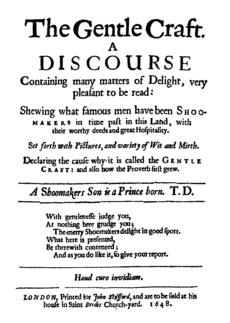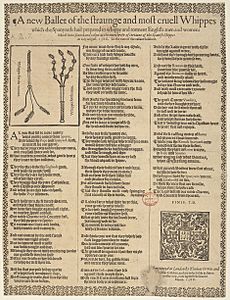Thomas Deloney facts for kids
Thomas Deloney was an English writer who lived a long time ago. He was born around 1540 to 1560 and passed away just before 1600. Thomas Deloney was known for three main things: he was a silk-weaver, a writer of stories (novels), and a writer of popular songs called ballads.
Contents
Thomas Deloney's Life Story
Thomas Deloney was born in the middle part of the 1500s. We don't know the exact date. Many people thought he was from Norwich, but he was probably born in London. In London, he learned the skill of silk-weaving.
Silk-weaving was a popular job in England during the 1500s. Many people from France and Wallonia (part of Belgium) worked in this trade. Deloney's name sounds like a French name, so his family might have come to England more recently. We know he had a son named Richard, who was baptized in London in 1586.
Becoming a Popular Writer
In the 1580s and 1590s, Thomas Deloney became famous for writing popular songs. These songs were called ballads. Many of them were printed on single sheets of paper called broadsides. People would buy these broadsides to read the latest news or stories.
Deloney wrote about many different things. He wrote about English history and romantic tales. He also wrote about religion and good behavior. Sometimes, he wrote about social issues and politics. He even reported on current events, like a journalist.
When His Writings Caused Trouble
Sometimes, Deloney's writings about social and political topics caused problems. In 1595, he was put in prison for a short time. This happened because he helped write a letter. The letter was from a group of weavers who wanted the rules of their company to be followed more strictly.
In 1596, he wrote a ballad about not having enough grain (food) in London. The mayor of the city, Stephen Slaney, did not like this song. He said it was "rude" and "too bold." The mayor was worried because Deloney wrote about the queen talking to her people. The mayor thought this might make poor people unhappy.
Writing Famous Stories
Later in the 1590s, Deloney started writing longer stories. Today, we call these stories novels. He published four main novels in the last few years of his life (1597–1600). These books are what he is most remembered for now.
His novels were incredibly popular. People read them so much that the first copies wore out! Because of this, we only have copies from the 1600s today. Deloney's novels mixed historical adventures with real-life details about society and money. He used his own experiences as a craftsman and merchant in London to make his stories real.
His books often showed the lives and interests of the growing "middle class" in England.
- Jack of Newbury was about a famous cloth-maker named John Winchcombe. It was dedicated to all the cloth-makers in England.
- The Gentle Craft was dedicated to shoemakers. It told stories about famous shoemakers from the past. This book was so popular that two plays were made from it: The Shoemaker's Holiday and A Shoemaker a Gentleman.
Deloney's Writing Style
Thomas Deloney knew about fancy writing styles, but he usually wrote in a simpler way. His writing was direct and lively. It was a bit like the popular joke books of his time. He used a lot of dialogue (people talking) in his stories. This was different from other writers then. His style was also similar to how plays were written.
His Final Years
Thomas Deloney likely passed away in early 1600, or maybe late in 1599. Another writer, William Kempe, mentioned a song called "Thomas Deloney's Epitaph" in April 1600. Kempe also wrote about Deloney as "the great Ballet-maker, T.D." He said that Deloney "died poorly" but was "honestly buried." We don't know anything else about when or how he died.
Thomas Deloney's Works
His Poems and Songs
- The Garland of Good Will: This was a collection of many different ballads. Many of these songs were first printed on broadsides. The book was officially recorded in 1593, but only copies from the 1600s still exist.
- Strange Histories of Kings, Princes, Dukes, Earles, Lords, Ladies, Knights, and Gentlemen: This book had ballads about historical events. They were based on stories from a famous history book called Holinshed's Chronicles. We don't know when it was first published, and only copies from the 1600s remain.
- Miscellaneous broadside ballads: These were single-sheet songs. You can find copies and writings of them at the English Broadside Ballad Archive.
His Stories (Novels)
- The Pleasant Historie of Iohn Winchcombe, in his younger yeares called Iack of Newberie, the famous and worthy Clothier of England: This book was officially recorded in 1597. Only copies from the 1600s are still around today.
- The Gentle Craft [Part I]: This book was officially recorded in 1597. Only copies from the 1600s are still around today.
- The Gentle Craft: The second Part: This part was published before 1600. Only copies from the 1600s are still around today.
- Thomas of Reading or the Sixe Worthie Yeomen of the West: This book was published before 1600 and officially recorded in 1602. Only copies from the 1600s are still around today.
See also
 In Spanish: Thomas Deloney para niños
In Spanish: Thomas Deloney para niños
 | DeHart Hubbard |
 | Wilma Rudolph |
 | Jesse Owens |
 | Jackie Joyner-Kersee |
 | Major Taylor |



